The recently released and now-streaming Heads of State, directed by Ilya Naishuller, is an action-adventure film centered around two world leaders in grave danger. Will Derringer, once a celebrated action movie star, is now the President of the United States. Sam Clarke, the calm and tough Prime Minister of the United Kingdom, has a background in the British Army. Things quickly spiral into chaos when the two leaders meet for an international summit. A secret threat emerges, putting their lives at risk. The British government assigns a highly skilled MI6 agent, Noel Bisset, to protect them. She’s intelligent, fearless, and well-versed in handling dangerous missions.
Heads of State boasts an impressive star cast including Priyanka Chopra Jonas, Idris Elba, and John Cena. Cena plays Will Derringer, Elba plays Sam Clarke and Chopra portrays Noel Bisset, a top MI6 agent assigned to protect them both. As the story unfolds, the trio is thrown into a wild and unpredictable sequence of fights, chases, and plot twists. Along the way, they must collaborate to stay alive, uncover the force behind the threat, and stop a potential global catastrophe. Despite their different pasts and personalities, they gradually learn to trust one another and rely on their unique skillsets to fight back. Heads of State blends humour, action, and suspense, offering a tale of unlikely heroes navigating a world of secrets and peril.
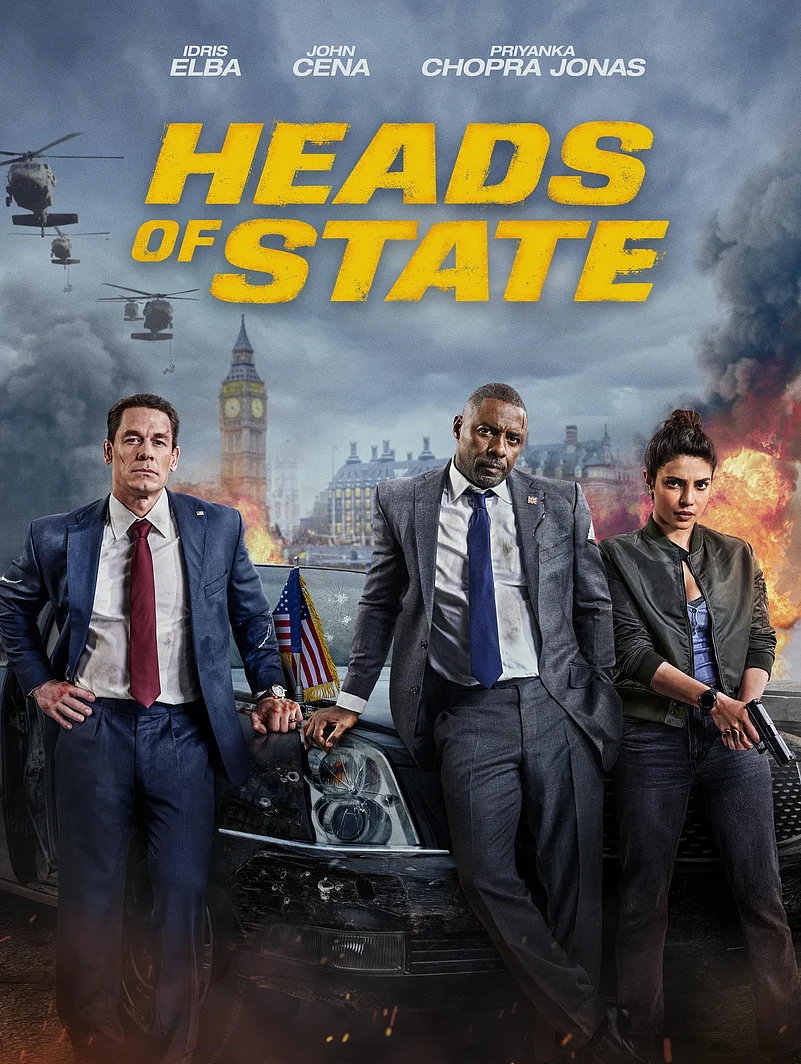
However, the storyline is a consolidation of elements we’ve seen several times before: two countries or leaders joining forces against a third-party threat to their lives and global peace; betrayal from someone close within their official circles; a guardian-like agent tasked with protecting them, who shares a romantic history with one of the leads; and a character previously associated with the enemy, who ends up offering crucial assistance in a bid for redemption. This film’s plotline is neither novel nor engaging. It lacks a substantial narrative and suffers from a lack of freshness, impactful dialogue, and strong performances from its two male leads.
The film opens with a scene featuring Noel Bisset disguised as a news reporter at the Tomatina festival in Spain. In reality, she is undercover, tracking Russian arms dealer Viktor Gradov. The enemy swiftly identifies and eliminates her team, disguised as camerapersons, festival attendees, and café customers. Despite her advanced action skills, Noel is overpowered, and the enemy escapes.
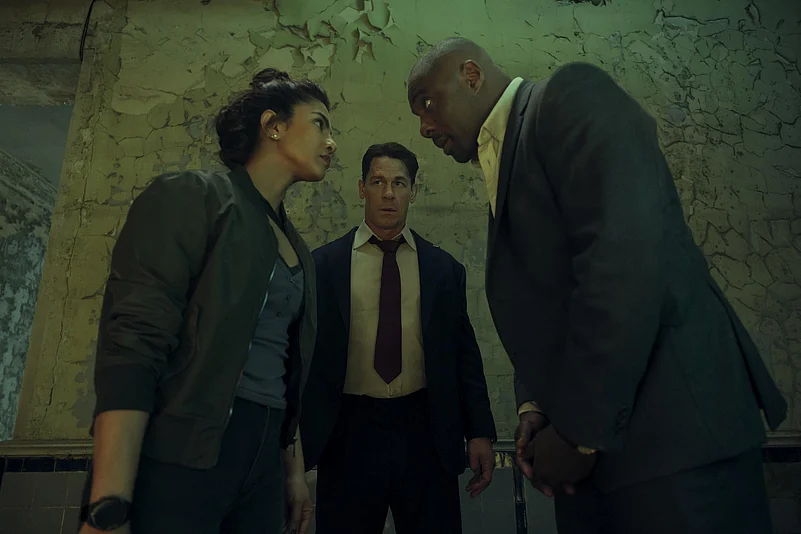
The movie then shifts to the two male leads, who bring elements of charm, bromance, and humour. Yet, it feels implausible to see two physically imposing men portrayed as incapable of defending themselves. It’s difficult to believe that they would require external protection. One is reminded of the reason Quentin Tarantino gave to Michelle Yeoh for not casting her in Kill Bill (2003-2004)—that no one would believe Uma Thurman could defeat her. Yeoh’s cinematic legacy as an action star would have challenged the believability of such a narrative. Similarly, Cena and Elba carry public images rooted in a constructed physical strength and toughness, making their helplessness in this film seem exaggerated and unconvincing. Regardless of type—be it serious, romantic, emotional, political, social, or action-comedy—believability undergirds every decent film. That responsibility lies directly with the filmmaker.
What becomes clear while watching the film is that the filmmakers themselves are not taking it too seriously. They’ve created a movie that indulges in silly humor and average performances, devoid of nuanced storytelling. It’s a vacation from meaningful content, and the film doesn’t seem concerned about being forgettable.
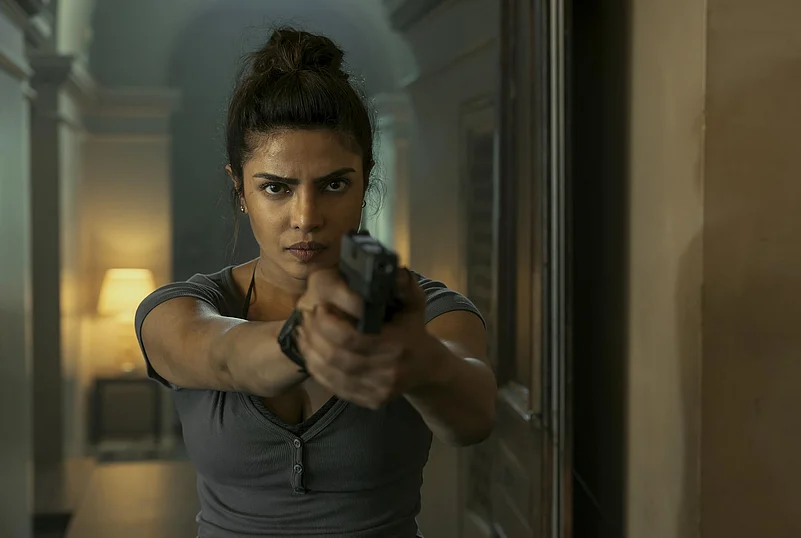
Yet, amidst all this, what truly stands out is Chopra’s emergence as a bona fide action movie star. Her presence and the choreography of her action sequences elevate the film to some degree. She convincingly portrays the physicality required for her role—handling guns, engaging in combat, and overpowering male opponents with credibility. Most scenes involving the two male leads revolve around dialogue and banter, which, quite frankly, border on the mundane. One wouldn’t feel guilty skipping past their scenes to get to Chopra’s action-packed moments, where she truly excels. Chopra leverages her status as a global star, and her participation has drawn South Asian audiences to anticipate and eagerly embrace the film.
Chopra has always had the potential to become an action star, though Bollywood barely recognised it. She has delivered powerful performances in films like Fashion (2008), Saat Khoon Maaf (2011), and Barfi! (2012); but it was in movies like Don and Don 2 (2006, 2011), and Drona (2008), that she showcased her comfort with action. Unfortunately, these films didn’t fully tap into that potential. Still, they laid the foundation for her pivot to Hollywood action cinema. Her role in ABC Studios’ Quantico (2016–2018), followed by Citadel (2023), and now Heads of State, marks her gradual rise as one of Hollywood’s most dependable female action stars. The action genre suits her; she looks comfortable, composed, and doesn’t seem to be trying too hard.
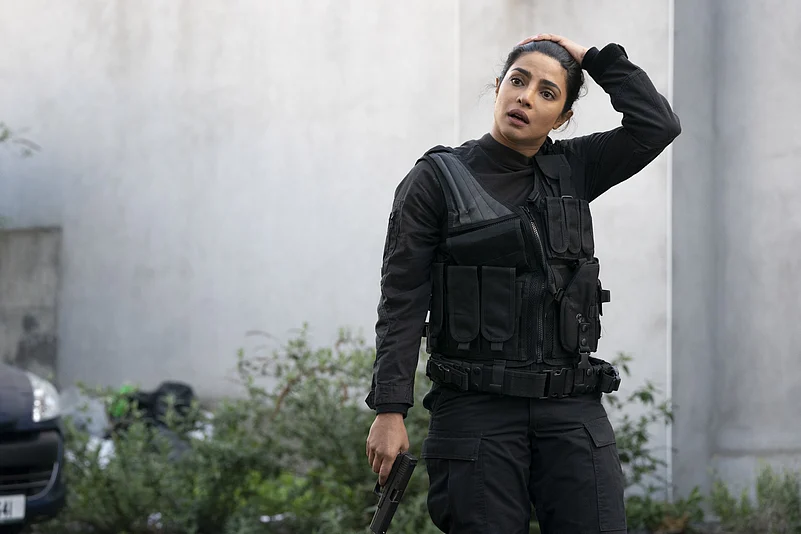
This is seen in her portrayal of Noel, who goes to any length to protect the two prominent leaders played by Cena and Elba. While the film fails to meet the excitement and expectations it generated regarding plot, content, and performance, it doesn’t dull Chopra’s shine. She’s a star whose stardom remains unaffected by the mediocrity of a film’s execution. Heads of State, despite weaving themes of politics, international relations, rivalry, bromance, bureaucratic complexities, and action, fails to present them compellingly or entertainingly, making it a film likely to be forgotten soon after viewing.
Noel and Clarke share a romantic past, with Clarke having left his uniformed duty to enter politics—a move Noel interprets as abandonment. However, Clarke later confides in Derringer, saying he entered politics, “because I wanted to build a better world for her and I to grow old together in.” Derringer calls it the most romantic thing he’s ever heard, to which Clarke replies, “She didn’t see it that way.” Like Hindi cinema, Hollywood has its conventions, and the romantic history between two agents is one such trope that persists across Hollywood’s productions.
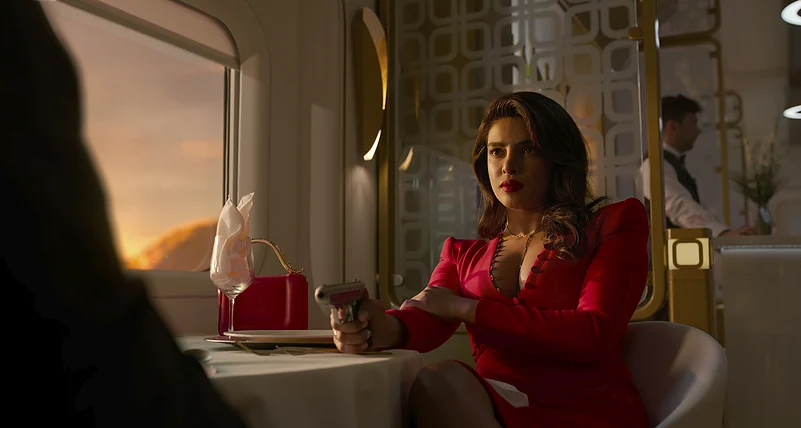
Chopra, as Noel, gets to do nearly all the most engaging things in the film: she is stunning, operates guns, executes sophisticated fight sequences, works proficiently with technology, and is sincerely committed to her mission. Her character is an archetype of a modern-day hero—a contemporary female protector shaped by socio-political contexts, rising to become a crucial political guardian. She not only leads the two male characters through danger but also propels the film’s narrative forward. For a South Asian actor, it’s rare to land such a significant action role in a primary Hollywood production—one that offers sustained visibility and influence. Regardless of the film’s financial or critical success, Chopra’s presence further solidifies the growing prominence of South Asian talent in global cinema.
Akishe L. Jakha is a Film and Media scholar from Nagaland, specializing in popular cinema and regional cinematic culture.















